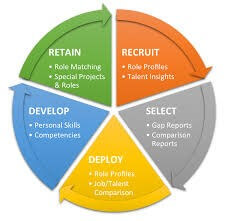HRM - Talent management | HRM Homework Help | HRM Assignment Help
HRM - Talent management
Talent Management is the ability to attract highly knowledgeable and skilled employees, retaining them by providing training and better opportunities to grow.

Talent management basically is all about managing human capital. Sourcing, recruiting, retaining the workforce is all a part of talent management.
Talent management is the process which manages and deal with the different talent employees bring to the office. It is practiced by considering and looking at every employee based on their aptitude, personality, talent, and character in relation to filling a specific job position within the organization.
Functions of Talent Management:
- Need an analysis of talent.
- Identifying talent sources.
· Drawing the attention to talent towards the company.
· In-house or outsourcing of candidates for recruitment and selection procedure.
· Managing appropriate and competitive salary rate.
· The talent pool is provided for training and led to development.
- Performance analysis of talent
- Career and future growth planning.
- Retaining management.
Advantages of Effective Talent Management
Effective talent management is the one which is properly planned and bring prosperity to the organization. Effective talent management leads an organization to the path of success as they source the best-suited talent which will help in achieving the goal of the organization.
Some Advantages of effective talent management are –
Constantly helps the organization in developing effectively and efficiently.
Leads to the development of a skilled workforce.
Increase retention of employees and decrease employee turnover.
Development of job satisfaction in employees.
Improve overall productivity of the organization with the help of skilled labor.
Talent management makes an employee know about their skills and perform accordingly and utilize them for the betterment of both organizations as well as for themselves too.
HRM Tutorials Topics
- Introduction
- Business Strategy
- Scope
- Planning
- Talent Management
- Training and Development
- Performance Management
- Employee Engagement
- Employee Performance
- Compensation Management
- Rewards and Recognition
- Organizational Culture
- Workplace Diversity
- Industrial Relations
- Dispute Resolution
- Ethical Issues
- Audit and Evaluation
- International HRM
- e-HRM
- Small Scale Units
HRM Assignment Topics
- Conflict Management
- Employment and Unemployment
- Human Capital
- Human resources
- HR management Homework Help
- Organizational culture
- Reward System
- Recruitment and Selection
- Bureaucracy and Adhocracy
- Communications management
- Consensus decision making
- Cross-functional team
- Employee research
- Fraud deterrence
- Group dynamics and Group think
- Hawthorne studies
- Human Relations Movement
- Industrial and organizational psychology
- Labor relations
- Labor and Wage
- Management effectiveness
- Managing change and change management
- Meetings
- Organizational behavior and commitment
- Organizational learning
- Organizational studies and development
- Quality
- Theory X and theory Y
- Time management

